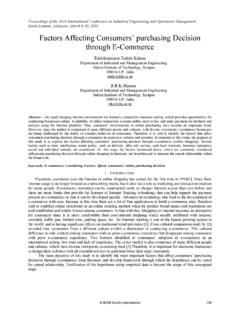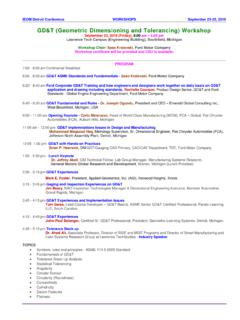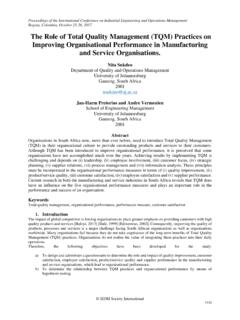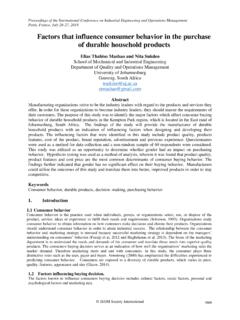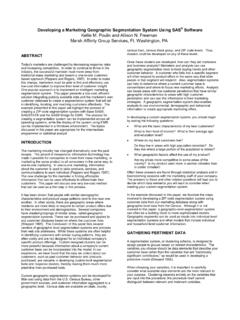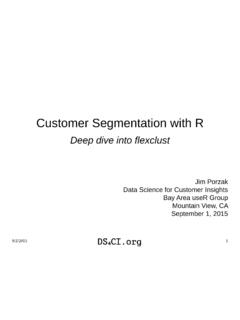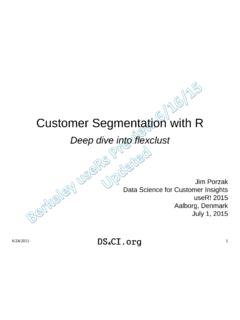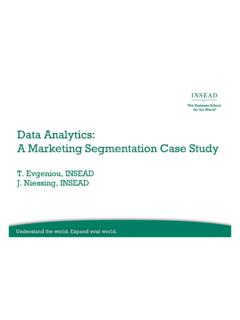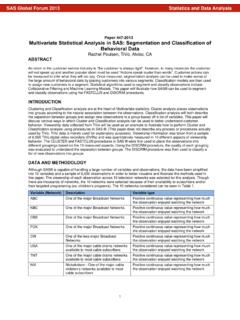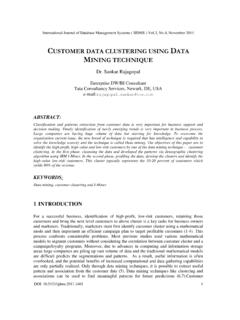Transcription of Profiling bank customers behaviour using cluster …
1 Proceedings of the 2011 International Conference on Industrial Engineering and Operations Management Kuala Lumpur, Malaysia, January 22 24, 2011 Profiling bank customers behaviour using cluster analysis for profitability Reza Baradaran Kazem Zadeh Industrial Engineering Department, Tarbiat Modares University, Al- Ahmad Highway, Tehran, Iran. Ahmad Faraahi Information Technology Department, Payame noor University, Lashkarak Highway, Nakhl street, Tehran, Iran. Amir Mastali Information Technology Department, Payame noor University, Lashkarak Highway, Nakhl street, Tehran, Iran. Abstract Analyzing information of bank 's customers for customer Behavior Modeling is a difficult problem since it is a multi dimensional problem. This study has been done in a bank at the analysis of customer s behavior that isn t limited to customer s benefit in their general uses of banking services and also is considered as channel s charges.
2 In this study, used of k-means for customer segmentation according to important characteristic of customers and their behaviors in using a channel. The result of segmentation of customer s profile is according to their behavior which will help the bank for retention strategies of current customers and attracting new customers . Keywords customer behavior modeling, Analytical customer relationship management, segmentation , Classification 1. Introduction bank 's large databases and voluminous information contain customer 's information and the history of their transactions. These databases could help them to increase profitability, since they need to use more and better ways for analyzing their customers and increase their profitability. Analyzing databases and data mining are the basics of customers Relationship management. Also segmenting and classification of customers according to Data mining techniques is one of the most profitable Applicable and actually the most practical affairs in analytical customer Relationship Management.
3 Special attention to these issues, in recent years is providing multiple and sometimes ingenious solutions in this field. Most activities done so far are based on customer 's grade and their credibility and their analysis of customer is for the validity of customers to take on loan. Also some are trying to analyze customer behavior considering customer s RFM1 factor in a year. But little studies have been done on the analysis of customer behavior according to their profitability. The major point in this research is Profiling customers according to their profitability for bank . With the analysis of profiles we can answer to the questions that make banks successful in their business, the questions like targeting actual and potential customers , offering incentive programs for retaining customers and offering propaganda plans for attracting profitable customers .
4 2. Reviewing the literature Nowadays with the advancement of information technology, new systems have been generated that can help organizations at reducing internal costs, better interaction with the environment and ultimately can help them to profit. One of these tools is customer Relationship Management (CRM). CRM is a strategic approach that is 1 Recency , Frequency , Monetary 458 Reza Baradaran Kazem Zadeh, Ahmad Faraahi, Amir Mastali concerned with creating improved shareholder value through the development of appropriate relationship with Key customers and customer segments. CRM provides enhanced opportunities to use data and information to both understand customers and co-create value with them. This requires a cross-functional integration of processes, people, operations, and marketing capabilities that is enabled through information, technology and applications [6].
5 CRM has three categories of operational, analytical and Collaborative [14]. Since in this article has been used of data mining techniques for analytical customer relationship management, so in this section we review its literature. Analytical customer Relationship Management Analytical customer relationship management including activities such as capture, storage, extraction, processing, interpretation and reporting customer 's data to the organized user that would analyze them according to their needs [7]. This advanced kind of CRM In addition to providing statistics about the situation of sales, marketing and support, would analyze level of satisfaction and loyalty of customers [3]. Necessary analytical tools must be able to provide rapidly and in the real-time various types of analysis of the gathered data requesting by banks operators [16].
6 Analytical CRM provides the capability to be able to understand client's needs through talking communication centers, catalogs and Web tools and after analyzing this information they would create the ability of useful movement for the company and customer [13]. In this type of CRM will use data mining methods and online processing for interpretation and production of information from the Data. Xu and Walton [16] assert that the essential of acquiring customer knowledge is to know not only who they are ( customer Profiling and segmentation ) but also how they behave and what pattern they follow. customer knowledge acquisition should be considered as a continuous and dynamic process, to collect information about new customers , existing customers (internal) and defecting customers . Knowledge about prospective customers and customers who are loyal to competitors (external) should also be attained.
7 Managers need to be aware of the power of analytical CRM systems and the strategic importance of gaining customer knowledge. Xu and Walton [16] further state that retaining existing customers is perceived more important than acquiring new customers and turning external and prospective customers into the company's customer is often the battleground between competitors. The analytical CRM system offers the function of Profiling and analyzing prospective customers which this requires data to be fed into it from both internal and external sources. Bolton [2] refers that in a bank 's CRM system first should be well established banking processes like checks, withdrawals and transfers. Although in transactions directly has no concept of customer and its value. Bolton [2] refers to a bank s CRM system by suggesting that maintaining the processing of checks, withdrawals, transfers, etc.
8 Is well established. Profiling and Segmenting customers In addition to identifying strategically significant customers , the analytical CRM system will help profile and segment existing customers . customer Profiling integrates several aspects of customers into a rational evaluation, such as customer details, historical records and contact details, customer attractiveness, or customer satisfaction [9]. Ferguson et al. (2004) reported such a system used in a financial service company that can profile customers and the service representative can instantly assist the customer by extracting the entire relevant customer s information. Even though customer Profiling is oriented more towards the operational function than the analytical function, it does provide a broad view of each customer . This is the information required to understand the true value of the customer and gain insights to realize customer behavior [16].
9 Segmenting customers provides approaches to better understand their preferences and to more efficiently allocate resources based on the information. The benefit is twofold: First, it enables companies to differentiate themselves by providing appropriate and suitable services for their customers needs; therefore, building up a competitive advantage. Second, it guides the companies to where their most valuable customers are located and helps allocate major capital, effort and time to generate the most profit [15]. segmentation is a key method employed by banks to better understand and to service their customers in this increasingly competitive environment [5]. Market segmentation is one of the central concepts in marketing and customer profitability as a segmentation criterion is a newer phenomenon which has become increasingly prevalent in many industries, leading to differential treatment of customers [12].
10 One of the most important points for customer Profiling is targeting valued customer and having special attention to them [11]. Xu and Walton [15] distinguished four criteria for segmenting customers : customer profitability score, retention score, satisfaction and loyalty score, response to promotion. PeopleSoft uses a customer scorecard to track key performance measurements and communicate progress against CRM-related goals. The key performance indicators (KPIs) delivered with the customer scorecard for an organization's financial goals (revenue, margins, profitability); customer goals (acquisition, retention, satisfaction); process goals (campaigns, sales, and support); for workforce goals (retention and competencies).The possible criteria to support customer segmentation are: 459 Reza Baradaran Kazem Zadeh, Ahmad Faraahi, Amir Mastali profitability by customer and distribution channel; cost to support by product and customer ; average order value by customer ; customer acquisition rate; customer defection rate; repeat customer rate; and customer satisfaction [16].
